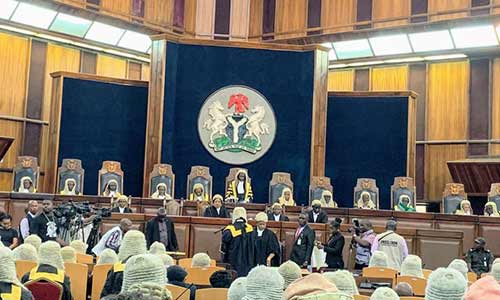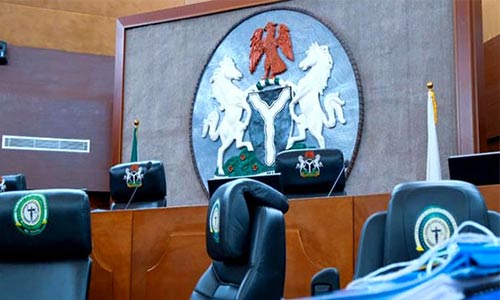SUPREME COURT JUDGEMENTS 05/03/2024
Whether Judgement’s Brevity Is Sufficient Ground To Vitiate It

In the Supreme Court of Nigeria
Holden at Abuja
On Friday, the 15th day of December, 2023
Before Their Lordships
John Inyang Okoro
Helen Moronkeji Ogunwumiju
Adamu Jauro
Tijjani Abubakar
Emmanuel Akomaye Agim
SC.158/2013
Between
MR SULE OBAJE APPELLANT
And
NIGERIAN AIRSPACE MANAGEMENT AGENCY RESPONDENTS
(Lead Judgement delivered by Honourable Adamu Jauro, JSC)
Facts
The Appellant was an employee of the Respondent until 10th May, 2005, when he was dismissed. The events leading to his dismissal arose on 29th July, 2004, when he was issued a query containing allegations that on 6th July, 2004, he absented himself from duty without obtaining leave and travelled to Abuja to transact unofficial business on behalf of another organisation and customer of the Respondent named “STOP-HERE Aviation Services Ltd”, for purposes unconnected with the furtherance of the interest of the Respondent. The query stated that the Appellant’s actions, were in contravention of the Respondent’s Staff Conditions of Service and Public Service Rules. The Respondent responded to the query; however, his response was deemed unsatisfactory and by a letter dated 17th August, 2004, he was suspended from work without pay and ordered to appear before the Respondent’s Disciplinary Committee. After the Appellant appeared before the Disciplinary Committee, he was found culpable of the acts of misconduct alleged, and consequently, dismissed from the service of the Respondent.
Thereafter, the Appellant instituted an action against the Respondent at the Federal High Court, Lagos Division, for wrongful termination of his employment. The case of the Appellant was that, by virtue of the Respondent’s Employee Handbook, he was entitled to three written warnings before disciplinary action could be taken against him, but, he was not issued with any such written warning. On its part, the Respondent maintained that it followed due process in dismissing the Appellant. At the conclusion of trial, the trial court delivered its judgement, in which it held that the Appellant was afforded fair hearing by the Respondent before his dismissal. The trial court thus, dismissed the suit.
Aggrieved, the Appellant appealed to the Court of Appeal. In its judgement, although the Court of Appeal held that the trial court could have done better with its evaluation of the evidence led at trial, it however found that the trial court pronounced on the main issue as to whether the Appellant’s dismissal was in accordance with the Respondent’s Conditions of Service and the trial court’s decision did not occasion any miscarriage of justice on the Appellant. Dissatisfied, the Appellant appealed to the Supreme Court.
Issues for Determination
The Supreme Court considered the following issues in its determination of the appeal:
- Whether the holding of the learned Justices of the Court of Appeal that, in spite of the brevity of the judgement of the trial court, the trial court considered what was relevant for judgement, it did not occasion a miscarriage of justice in view of the non-evaluation of evidence adduced before the trial court.
- Whether the Court of Appeal was right, in holding that that the Respondent followed due process in the dismissal of the Appellant.
Arguments
Arguing the 1st issue, counsel for the Appellant submitted that it is the function of a trial court to receive admissible evidence, evaluate it, ascribe probative value to it, make findings thereon and come to a conclusion one way or another, otherwise a miscarriage of justice would have been occasioned and an appellate court would have a duty to intervene. He argued that by the combined effect of Section 3.4.1(c) and 3.4.5(iii) of the Respondent’s Staff Conditions of Service, action could only be taken against the Appellant if he absented himself for a week and after three written warnings had been issued to him; however, no such written warning was issued to him. He argued that the Appellant relied on the Respondent’s Staff Conditions of Service to prove his case, yet, the trial court did not make any pronouncement on the said exhibit. He submitted that the trial court did not evaluate any of the evidence presented before it, and due to the trial court’s failure to evaluate evidence, it cannot be said that justice was done.
It was the further submission of counsel that the statement of the Court of Appeal to the effect that the trial court ought to have undertaken a little more evaluation of the evidence adduced established that the trial court did not properly evaluate the evidence before it. He therefore submitted that the Court of Appeal was in error when it nevertheless, held that the trial court considered what was relevant in the case before it.
Conversely, counsel for the Respondent submitted that the comment of the lower court on the brevity of the judgement of the lower court did not fault the reasoning behind the judgement, as the court merely meant that the trial court ought to have given a more extensive reason for its decision. He submitted that in spite of the brevity of the trial court’s judgement, the trial court duly considered the relevant question as to whether the Respondent complied with its Staff Conditions of Service in the dismissal of the Appellant.
On the 2nd issue, counsel for the Appellant submitted that the Respondent cannot argue that the dismissal of the Appellant was in accordance with due process, when the record of proceedings of the disciplinary committee and the Public Service Rules which he was alleged to have contravened were not put in evidence before the trial court by the Respondent. He argued that the Appellant was entitled to three written warnings before a disciplinary committee could take any disciplinary action against him, and since he did not receive any written warning before being suspended and subsequently dismissed, his dismissal did not follow due process and he ought to be reinstated.
Counsel for the Respondent, on the other hand, argued that the requirement of three written warnings within a year before disciplinary action is taken, insisted on by the Appellant, applies only in cases of minor misconduct. He argued that this was unlike the act of the Appellant which amounted to a breach of the Public Service Rules, and which was considered an act of gross misconduct that warranted disciplinary action without previous warning. He further argued that the non-tendering of the record of proceedings of the disciplinary committee which heard the case of the Appellant and the Public Service Rules are irrelevant, so long as there was evidence to support the case of the Respondent and the judgements arrived at by the two lower courts.
Court’s Judgement and Rationale
In determining the 1st issue, the Apex Court reiterated the time-long principle that the court has a duty to consider and evaluate all material facts and issues placed before it during trial, and where material issues and facts relating to a case are not evaluated at all or adequately evaluated, it may lead to a miscarriage of justice. The Court held however that, where the omission or failure complained of, is with respect to matters not affecting the determination of the case, no miscarriage of justice would have occurred. The Court held that, the manner of writing judgements cannot be made universal to Judges, and the most important requirement is for the judgement to incorporate the known elements of a good judgement. Therefore, the judgement of a court cannot be vitiated simply because of the Judge’s style of writing.
The Court relied on its decision in NWOKORO & ORS. v ASHUE (2003) LPELR – 59744 PP 10-11 PARAS F(SC) in which it held that, every Judge has his personal style of judgement writing and therefore, there is no single standard and acceptable form of writing a judgement, so long as the judgement captures the essential ingredients of a good judgement and resolves the issue or issues for determination. Finally, the court held that though the judgement of the trial court was quite brief, it met the parameters of a valid judgement, in that it touched the essential parts needed to show that the Judge understood the claim of the parties such that even if the trial court had made pronouncement on every issue and argument canvassed by parties, the final judgement would not have been different from what it is now. In spite of the brevity of the judgement of the learned trial judge, the trial court considered what was relevant for the determination of the dispute between the parties in accordance with the evidence adduced before it, and the brevity of the judgement has not led to any miscarriage of justice.
On the 2nd issue, the Court held that based on the principle that he who asserts must prove, it was the duty of the Appellant who asserted that his dismissal did not comply with due process, to demonstrate how the process leading up to his dismissal violated due process. If he was of the opinion that the disciplinary committee did breach any law, rule or procedure, he ought to have tendered the record of proceedings and likewise, if he was of the view that he did not breach the Public Service Rules as alleged, he ought to have tendered the Rules or caused it to be produced before the court. He cannot shift that duty to the opposing party. The Court held that having not placed the said documents before the court, he cannot complain about failure to tender documents which he failed to tender.
In resolving this issue, the Court reviewed the relevant provisions of the Respondent’s Staff Conditions of Service which contained the definition and types of misconduct, the penalties for erring officers and the procedure to be followed in imposing any of the penalties. The Court emphasised on the provisions in the Conditions of Service which prescribed that, in relation to serious misconduct, the erring employee would be issued a written query which must be answered within a specified period and which response would determine if such employee should be suspended, exonerated, warned or referred to the appropriate disciplinary committee. The Court held that the Appellant was duly issued with a query, afforded the opportunity to respond which was found to be unsatisfactory, before he was suspended in line with the provisions of Respondent’s Staff Conditions of Service. The Court also held that the Appellant’s dismissal after appearing before the disciplinary committee and being found guilty of misconduct, was also in line with the provisions of the said Conditions of Service.
Appeal Dismissed.
Representation
Dr M. O. Ubani with Mr D. D. Asema and H. E. Okusuwha for the Appellant.
Ademola Oyedokun with Charles Uzoka for the Respondent.



